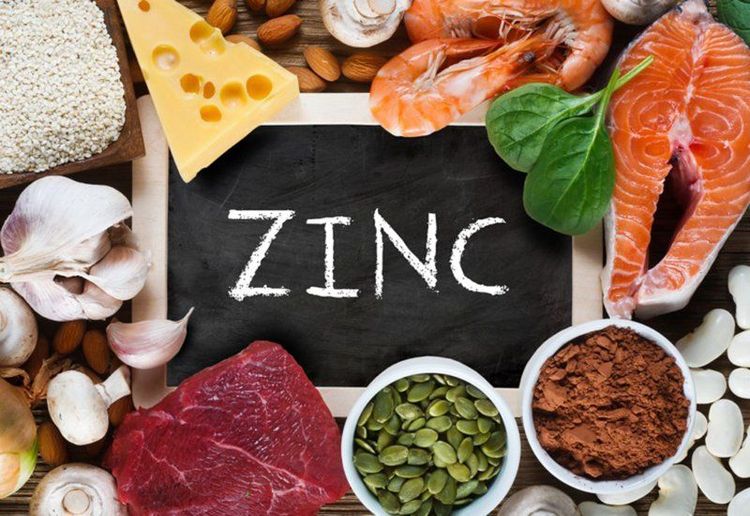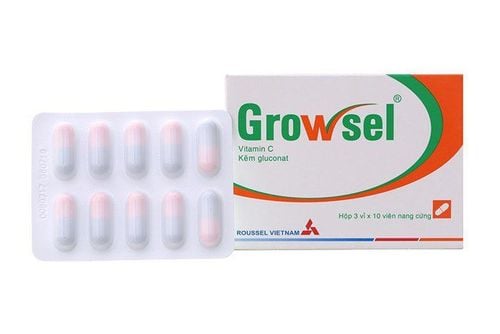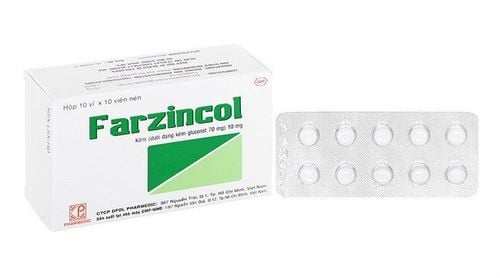This is an automatically translated article.
Zinc is one of the most important trace elements in the body, undertaking many biological functions such as catalyzing enzymes, the structure of many proteins, and hormones. Zinc is also considered as a key element contributing to cell division and differentiation, programmed cell death, and gene transcription. The diverse biological roles that zinc deficiency play can lead to a number of adverse health effects. Zinc supplementation is effective in the treatment of diseases caused by zinc deficiency. In addition, many experimental studies mention that zinc is also related to the aging process of the body, thereby emphasizing the importance of zinc in the elderly.
1. Overview
Zinc is considered the most important trace element in the body. After the discovery that zinc is an essential component in microorganisms in 1860, in plants in 1900 and in animals around 1930, the number of studies involving zinc during the past decade increased. increased rapidly, in order to demonstrate the extent to which zinc affects various cellular and body functions.
The most prominent research on the biochemical functions of zinc includes:
Catalyzing the action of more than 200 enzymes The structure of many macromolecules in the body including several enzymes, hormones, neuropeptides, hormone receptors subjects, and possibly polynucleotides. Normal growth and development of the human body from the fetal stage to adulthood and aging requires the participation of zinc. This trace element is involved in cell division and differentiation, cell death, gene transcription, biofilm activity and apparently many other enzymatic activities.
More recent studies show that zinc is essential for maintaining coordination between major homeostatic networks, including the nervous, neuroendocrine, and immune systems, throughout human life. , adds a new theory to the approach to explaining the aging process of the body.

Cơ thể thiếu kẽm có thể ảnh hưởng tới quá trình lão hóa và là nguyên nhân gây ra một số bệnh
2. Zinc and the aging process
Although human data are fragmentary and the full picture of zinc's role is not complete, many researchers have been skeptical about its role in aging in humans. thanks to findings in laboratory animals.
First of all, it has been asserted that the immune system may represent an accelerating factor in aging, because the thymus, the main organ of the immune system, begins to invade quite early in life. lifetime (about 20 human years) and as a result, T-lymphocyte-dependent immunity gradually becomes less effective. However, experiments in rodents, performed throughout its life cycle, have demonstrated that immune modifications associated with aging such as decreased thymic hormone production, decreased T helper and T-suppressor, and NK cells can be prevented by zinc supplementation. Furthermore, oral zinc supplementation, in aged mice, was able to induce thymocyte proliferation with increased thymus hormone production and increased percentage of thymulin-producing cells, as well as restoring completely restored the number of Thy 1,2+ and Lyt 1+ cells in the spleen, and partially restored the active PHA and NK cytotoxic responses of the spleen cells. Furthermore, zinc supplementation in aged rats also restored abnormally low serum thyroid hormone levels.
The hypothesis of the effect of trace elements on the physiological aging process of humans was noticed after observing that with the increase of age, eating habits are always changing, and the Reduced absorption of some micronutrients is almost inevitable.
Zinc is the subject of large-scale research in many developed countries in the world such as the United States, Sweden and Australia. Most studies agree that the average daily intake of zinc is often less than the recommended adult zinc requirement of 15 mg. The same studies also reported that the serum zinc concentration gradually decreased with age, while the zinc content in the white blood cells appeared to be unchanged.
Studies conducted in the 1990s, based mainly on laboratory measurement techniques, tended to fail to note a decrease in zinc levels in the elderly, and even a change. Changes in intestinal zinc absorption were no longer observed in more recent and complex studies. In recent decades, the average life expectancy of the general population has gradually increased and the diet is more complete, and technical methods of measuring zinc content are more reliable, so that differences between studies Studies of older populations over different time periods may partly explain.
In recent times, zinc deficiency in the elderly has changed. In other words, the risk of zinc deficiency in the elderly is increased compared with the general population. Body zinc content is directly related to enhanced dietary attitudes and hygiene habits of the elderly population. On the other hand, many age-related diseases, can cause zinc deficiency.

Nguy cơ thiếu kẽm ở người già đang có dấu hiệu tăng lên
3. Some diseases caused by zinc deficiency
Disorders in zinc metabolism or decreased zinc supplementation can lead to a number of diseases involving many organs in the body. The pathogenesis of zinc deficiency has not been clearly defined, and the cause-and-effect relationship with the disease is not yet known in detail. Despite these methodological problems, the high success rates achieved with zinc supplementation in zinc-deficiency conditions have reported some positive results in a wide variety of situations.
Zinc deficiency neuropathy
Alterations in zinc metabolism are often associated with certain diseases of the nervous system. Zinc catalyzes many actions on enzymes, hormones and neuropeptides involved in brain function. This is the basis for the association between zinc deficiency and neurological diseases, including macular degeneration, but the specific cause-effect relationship has not been determined. Zinc supplementation has shown some beneficial effects. The effectiveness of zinc supplementation in Alzheimer's disease is debated; Some patients experience improvement in symptoms, while others notice negative effects.
Infectious and parasitic diseases
Zinc deficiency is quite common in people with these diseases. In addition to malabsorption, particularly in the setting of gastrointestinal infections, zinc absorption may be particularly impaired as a consequence of increased Ill synthesis and release, due to its role in the synthesis of zinc. metallothionein in the liver. IFNal also reduces plasma zinc concentrations. Alterations in the body's zinc levels seem to be quite important in these diseases, because it causes thymic failure.
Dermatological diseases
Zinc is a dietary factor for the epidermis; however, the cause-effect relationship in dermatological diseases due to zinc deficiency remains unclear.
Metabolic diseases
Zinc deficiency occurs fairly frequently and is associated with two main causes: increased urinary zinc loss, as occurs in kidney disease, diabetes mellitus, alcoholism, osteoporosis, or reduced intestinal absorption in cirrhosis. The efficacy of zinc in these conditions is supported by a wide body of evidence, but its clinical application is still limited.
Cancer
There is increasing evidence that tumor growth is related to changes in zinc content. Decreased plasma zinc concentrations are common, but the pathogenesis of malnutrition or excessive binding to intracellular proteins in cancer cells has not been determined. Correlation is observed between active cell neoplasia and zinc defects in leukemia. However, trials of zinc supplements in cancer have been too few to draw any conclusions.
Cardiovascular disease
Recently, there is evidence of changes in zinc intake in diseases related to the cardiovascular system, and mainly related to the role of zinc in the biological activity of angiotensin converting enzyme inhibitors. No zinc supplementation trials have been performed in this patient population.
Zinc plays a role in affecting most biological processes taking place in the body, especially the breakdown and synthesis of nucleic acids, proteins... Organs in the body when zinc deficiency can lead to some diseases such as neurological disorders, metabolic diseases, ... and aging.
>> Learn more about: The role of zinc and guidelines for reasonable zinc supplementation.
Please regularly visit Vinmec.com website and update useful information to take care of your baby and family.
References: europepmc.org, researchgate.net, pubmed.ncbi.nlm.nih.gov













